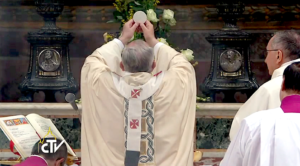– Don Enrico Finotti
Why so much confusion in the liturgy, despite so much clarity in the documents of the Magisterium?
It is necessary first of all to recognize the immense good brought by the liturgical reform where it was implemented gradually and faithfully to the laws established by the Church. The Magisterium has always accompanied with frequent and opportune documents the itinerary of the concrete implementation of the rites in the vital context of the Christian communities. We cannot, however, also deny the influence of strong abusive drifts, which continue to influence even today, both the interpretation and the celebration of the new liturgical ordines. The causes are multiple and of different kinds. We can however make some considerations:
1. Those who have followed the post-conciliar ecclesial journey and are attentive to an objective reading of the facts will be able to recognize that, especially in the immediate post-conciliar period, a vast phenomenon of ‘prophetism’ was widespread in the Church, which penetrated every environment like a thin patina, held necessary to be accredited as interlocutors in the public debate. All were ‘prophets’: religious, social and political leaders, ecclesial communities and leading parishes, new opinion movements, the most ‘sensitive’ ecclesiastics, the most ‘open’ intellectuals, the most popular theologians and the clergy more ‘advanced’, etc. A mediatic involvement with a strong youthful character, combined with mass demonstrations, assured this revolutionary, by now disruptive prophecy, a strong fascination and a prospect of a now unstoppable future.
2. However, all these “prophets” – noisy and mutually opposed – had, however, a common enemy: the Church as an institution and its Magisterium. All declared themselves “prophets” and had the right to “prophecy,” except the Church and the Magisterium, the only ones excluded in a prejudicial way from the “prophetic charism.” Thus an endemic and transversal suspicion was created in all the ‘living realities’ of the Church: Rome is the enemy of ‘prophecy,’ the ecclesial institution is the instrument of its continuous extinction and it is necessary to be ‘prophetically’ critical of its pronouncements. Even the statement ‘We must obey God rather than men’ (Acts 5:29) was interpreted as a justification for ecclesial disobedience in the name of a better obedience to the ‘Spirit,’ understood however as the uncritical and mythical listening of the many ideas subjective and relativistic, functional to the prevailing ideologies of the most prominent leaders and opinion movements, which competed for the cultural, social and ecclesial landscape.
3. The logical consequence of this vision was the rejection of the classical principle according to which the verification of a charism had to pass through the examination of the Magisterium of the Church in a humble and sincere, even if suffered, obedience of faith. This was the path taken by the Saints and has always been one of the fundamental criteria of holiness and charismatic authenticity, in the light of participation in the passion of the Lord, as an interior purification and a sure guarantee of truth and authentic identification of the will of God. Instead, it was replaced the principle of a practical, sometimes violent, abusive action, putting authority before the fact and thus forcing it to issue compromise legal provisions to avoid the worst. The attitude of a peaceful confrontation and a patient waiting in charity was replaced by that of struggle and claim in a conflictual and ideological relationship.
If we apply this analysis to the liturgical reform, we understand how on the concrete plane it was possible to diverge from the norms established in the typical edition of the liturgical books and from the directives of the documents of the supreme Magisterium and take the path of a free creativity in which everyone did what they believed in a subjectivism without restraints.
In conclusion, perhaps the words of the Lord do not sound true through the mouth of the prophet Jeremiah when he says: “I did not send these prophets and they run; have I not spoken to them and they prophesy” (Jer 23-21)?
(From Il mio e il vostro sacrificio. Il liturgista risponde, 2018©Chorabooks. Translated by Aurelio Porfiri. Used with permission of the publisher. All rights reserved)


 Follow
Follow


